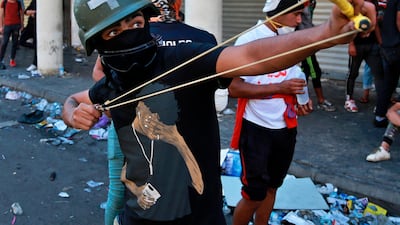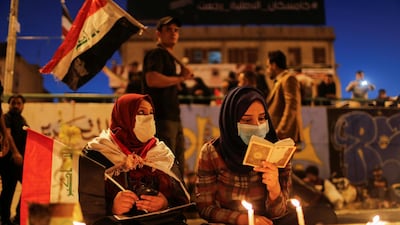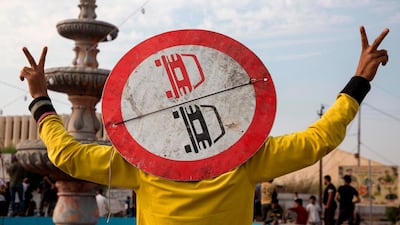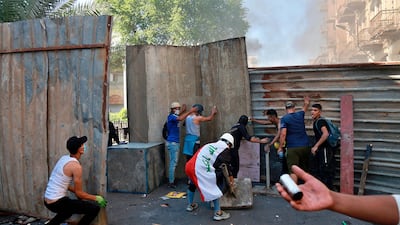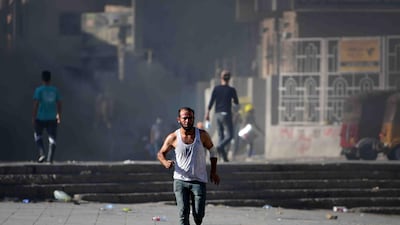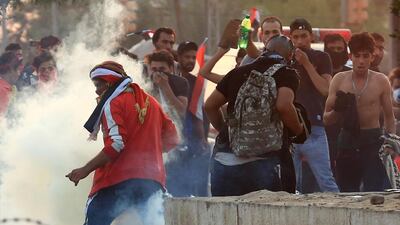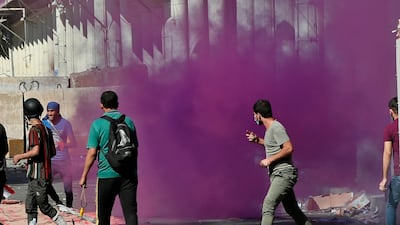Iraq’s top three officials banned the use of live ammunition and violence against protesters on Sunday after a security crackdown that killed more than 300 people.
Protests have gripped the country since the start of October, with demonstrators calling for an overhaul of the sectarian system established after the 2003 US-led invasion.
Baghdad will start the “legislation of a new electoral law”, a statement by Prime Minister Adel Abdul Mahdi, President Barham Salih and Parliamentary Speaker Mohamad Al Halbousi said.
“The three officials called for the accountability of those who carry out excessive violence against demonstrators,” the statement said.
They also praised demonstrators for maintaining a “peaceful movement putting the interest of the nation above their intentions".
Mr Abdul Mahdi’s spokesman said the prime minister was directly supervising the implementation of a reform package designed to satisfy the protesters.
The independent Iraq High Commission for Human Rights said on Sunday that 319 people had been killed since the protests started, with 15,000 wounded.
"The government must use UN standards when facing civil protests," an Iraqi official told The National.
“The use of violence must only be for self-defence or for the prevention of risk against civilians.
The commission and the Iraqi parliament's human rights committee complained about a lack of co-operation from government bodies that are supposed to provide casualty figures.
The government has, in recent weeks, restricted the release of official casualty figures, and medics and activists said they feared being followed or arrested for their involvement in protests.
The UN said it received "daily reports of killings, kidnappings, arbitrary arrests, beatings and intimidation of protesters".
Its top official in Iraq, Jeanine Hennis-Plasschaert, said a "climate of fear" was prevalent.
Security forces clashed with demonstrators in Baghdad’s Khilani Square on Sunday.
Twelve protesters were killed and 100 wounded on Saturday as security forces cleared out protest sites, medical sources said.
Nine were killed in Baghdad, most struck in the head by tear-gas canisters, while three died in the southern city of Basra.
The demonstrators in Baghdad had tried to reach the three bridges spanning the Tigris River that lead to the heavily fortified Green Zone, the seat of government and foreign embassies.
They were pushed from Sinak Bridge to the nearby Khilani Square, where 35 people were wounded, medical officials said.
Security forces also regained control of Ahrar and Shuhada bridges. Protesters have tried to force their way across on an almost daily basis.
On Friday authorities found a bomb under Sinak bridge and carried out a controlled explosion, state television reported.
Amnesty International called the crackdown a “bloodbath” and said Iraqi authorities should immediately rein in security forces.
"The government of Iraq has a duty to protect its people's right to life, as well as to gather and express their views," said Heba Morayef, Amnesty International's Mena director.
"This bloodbath must stop now and those responsible for it must be brought to justice.
"All government promises of reforms or investigations ring hollow while security forces continue to shoot and kill protesters."
In the southern city of Nasiriyah, security and medical officials said 31 people were wounded in clashes outside the education directorate as troops fired tear gas at protesters trying to block employees from reaching the building in the city centre.
Mr Abdul Mahdi on Saturday said his government considered "the peaceful protests of our people as among the most important events since 2003”, and vowed to meet demands for wide-ranging reforms.
He said electoral reforms would be tabled soon along with “an important government reshuffle”.
Mr Abdul Mahdi also acknowledged that his government had been blocking access to the internet
The demonstrators have complained of widespread corruption, a lack of job opportunities and poor basic services, including regular power cuts, despite Iraq’s vast oil reserves.
They rejected government proposals for limited economic reforms and called on political leaders, including Mr Abdul Mahdi, to resign.

